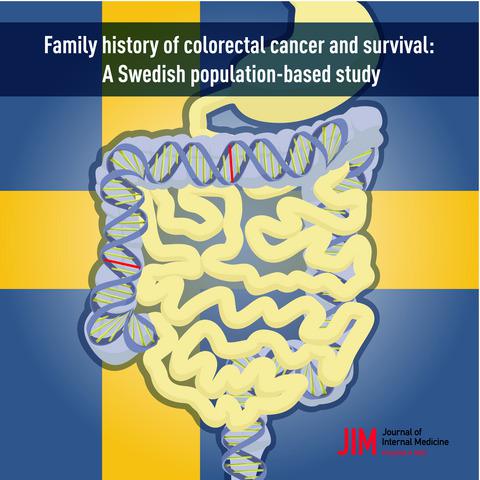当前位置:
X-MOL 学术
›
J. Intern. Med.
›
论文详情
Our official English website, www.x-mol.net, welcomes your feedback! (Note: you will need to create a separate account there.)
Family history of colorectal cancer and survival: a Swedish population-based study.
Journal of Internal Medicine ( IF 11.1 ) Pub Date : 2020-02-03 , DOI: 10.1111/joim.13036 F Pesola 1 , S Eloranta 2 , A Martling 3 , D Saraste 3 , K E Smedby 2
Journal of Internal Medicine ( IF 11.1 ) Pub Date : 2020-02-03 , DOI: 10.1111/joim.13036 F Pesola 1 , S Eloranta 2 , A Martling 3 , D Saraste 3 , K E Smedby 2
Affiliation

|
OBJECTIVES
A family history of colorectal cancer (CRC) is an established risk factor for developing CRC, whilst the impact of family history on prognosis is unclear. The present study assessed the association between family history and prognosis and, based on current evidence, explored whether this association was modified by age at diagnosis.
METHODS
Using data from the Swedish Colorectal Cancer Registry (SCRCR) linked with the Multigeneration Register and the National Cancer Register, we identified 31 801 patients with a CRC diagnosed between 2007 and 2016. The SCRCR is a clinically rich database which includes information on the cancer stage, grade, location, treatment, complications and postoperative follow-up.
RESULTS
We estimated excess mortality rate ratios (EMRR) for relative survival and hazard ratios (HR) for disease-free survival with 95% confidence intervals (CIs) using flexible parametric models. We found no association between family history and relative survival (EMRR = 0.96, 95% CIs: 0.89-1.03, P = 0.21) or disease-free survival (HR = 0.98, 95% CIs: 0.91-1.06, P = 0.64). However, age was found to modify the impact of family history on prognosis. Young patients (<50 at diagnosis) with a positive family history had less advanced (i.e. stages I and II) cancers than those with no family history (OR = 0.71, 95% CI: 0.56-0.89, P = 0.004) and lower excess mortality even after adjusting for cancer stage (EMMR = 0.63, 95% CIs: 0.47-0.84, P = 0.002).
CONCLUSIONS
Our results suggest that young individuals with a family history of CRC may have greater health awareness, attend opportunistic screening and adopt lifestyle changes, leading to earlier diagnosis and better prognosis.
中文翻译:

大肠癌的家族史和生存:一项基于瑞典人群的研究。
目的大肠癌家族史(CRC)是发展为CRC的公认危险因素,而家族史对预后的影响尚不清楚。本研究评估了家族史和预后之间的关联,并基于当前证据,探讨了该关联在诊断时是否随年龄而改变。方法使用瑞典大肠癌登记处(SCRCR)与多代登记册和国家癌症登记处相关的数据,我们鉴定了31 801名在2007年至2016年之间被诊断为CRC的患者。SCRCR是一个临床上丰富的数据库,其中包含有关癌症的信息分期,等级,位置,治疗,并发症和术后随访。结果我们使用灵活的参数模型估计了95%置信区间(CI)的相对存活率的超高死亡率比(EMRR)和无病生存的危险比(HR)。我们发现家族史和相对生存率(EMRR = 0.96,95%CIs:0.89-1.03,P = 0.21)或无病生存期(HR = 0.98,95%CIs:0.91-1.06,P = 0.64)之间没有关联。然而,发现年龄改变了家族史对预后的影响。家族史呈阳性的年轻患者(诊断时<50岁)比没有家族史的年轻晚期癌症(即I和II期)少(OR = 0.71,95%CI:0.56-0.89,P = 0.004),且癌症少即使在调整癌症分期后的死亡率也是如此(EMMR = 0.63,95%CI:0.47-0.84,P = 0.002)。
更新日期:2020-02-03
中文翻译:

大肠癌的家族史和生存:一项基于瑞典人群的研究。
目的大肠癌家族史(CRC)是发展为CRC的公认危险因素,而家族史对预后的影响尚不清楚。本研究评估了家族史和预后之间的关联,并基于当前证据,探讨了该关联在诊断时是否随年龄而改变。方法使用瑞典大肠癌登记处(SCRCR)与多代登记册和国家癌症登记处相关的数据,我们鉴定了31 801名在2007年至2016年之间被诊断为CRC的患者。SCRCR是一个临床上丰富的数据库,其中包含有关癌症的信息分期,等级,位置,治疗,并发症和术后随访。结果我们使用灵活的参数模型估计了95%置信区间(CI)的相对存活率的超高死亡率比(EMRR)和无病生存的危险比(HR)。我们发现家族史和相对生存率(EMRR = 0.96,95%CIs:0.89-1.03,P = 0.21)或无病生存期(HR = 0.98,95%CIs:0.91-1.06,P = 0.64)之间没有关联。然而,发现年龄改变了家族史对预后的影响。家族史呈阳性的年轻患者(诊断时<50岁)比没有家族史的年轻晚期癌症(即I和II期)少(OR = 0.71,95%CI:0.56-0.89,P = 0.004),且癌症少即使在调整癌症分期后的死亡率也是如此(EMMR = 0.63,95%CI:0.47-0.84,P = 0.002)。



























 京公网安备 11010802027423号
京公网安备 11010802027423号